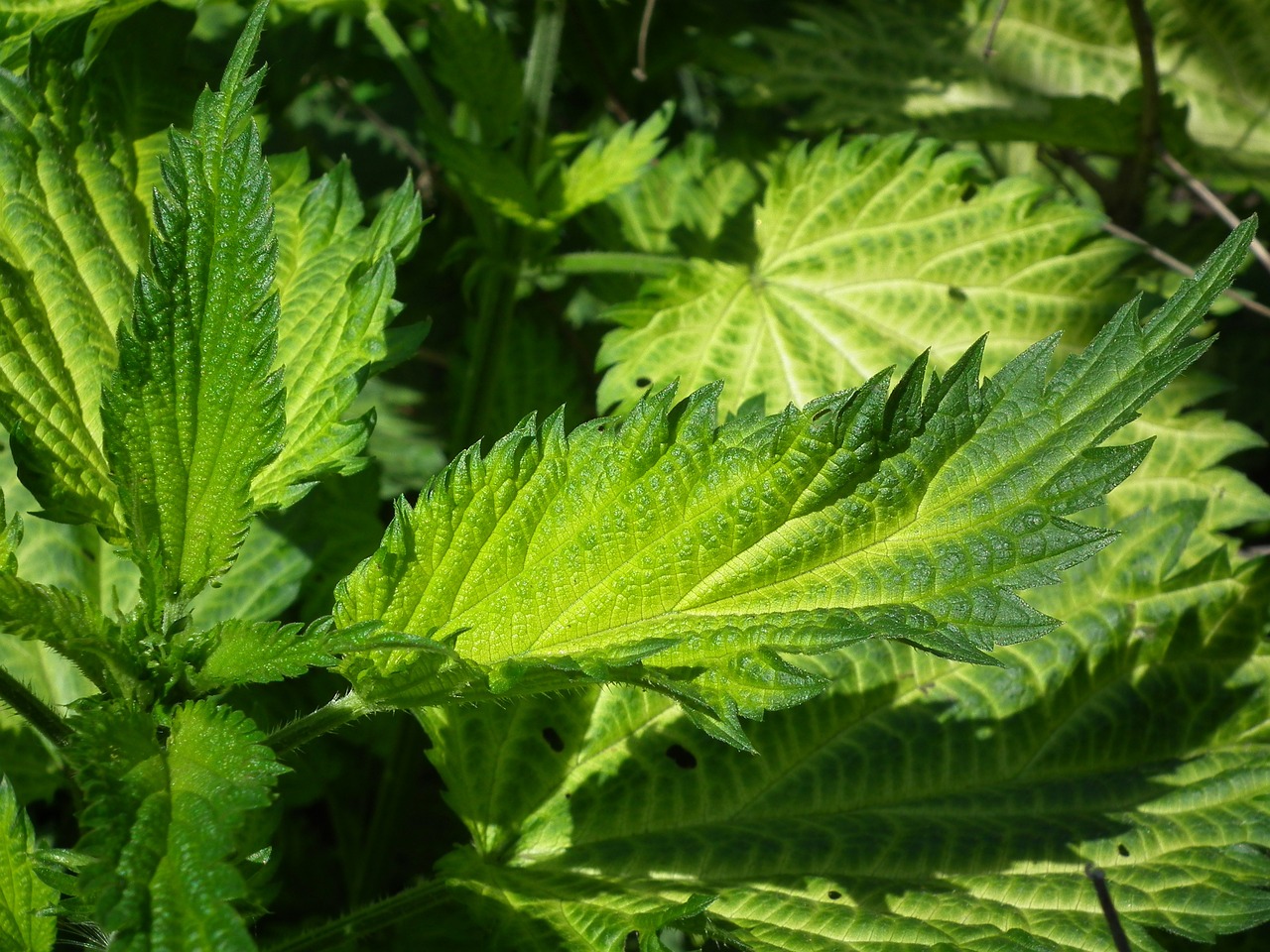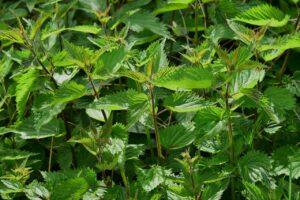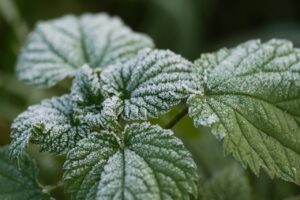Nettle Leaf
Overview
The Nettle Leaf, or Urtica dioica, is a perennial herb known for its sting and its long history in herbal medicine. Native to Europe and now found globally, nettles are nutrient-rich and have traditional uses ranging from a food source to treating ailments. Although commonly ingested or applied topically, smoking nettle leaves is not recommended due to insufficient evidence and potential respiratory risks.
Common name(s): Stinging nettle, common nettle, burn nettle, burn hazel.
Scientific name: Urtica dioica

Characteristics
Known for its stinging hairs, nutritional richness, and medicinal properties addressing inflammation and urinary health.
Region
Native to Europe, Asia, and North Africa; now widespread globally.
Natural Habitat
Commonly found in fields, forest edges, and along rivers or streams, often in areas with rich soil and partial shade.
Cultivation
Thrives in partial to full sunlight, prefers consistently moist soil with good drainage, and can tolerate a wide range of soil types including poor soils.
Traditional Usage
The use of Nettle Leaf, traditionally, extends to a variety of applications. Adapted for survival during hard times, it was much more than a mere irritant. Here’s how our ancestors leveraged this resourceful plant:
- As a vital food source during scarcity, highlighting its nutritional value.
- Employed in folk medicine, it was used to treat ailments such as joint pain and skin conditions.
- Nettle Leaf contained beneficial nutrients which led to its use for diuretic, anti-inflammatory, and analgesic properties2.
Although revered for its medicinal qualities, the present understanding of Nettle Leaf suggests seeking a healthcare provider’s guidance before integrating it into your wellness routine3.
Historical Usage
Used for medicinal and textile purposes by ancient civilizations across centuries.
Common Usage
Currently used as a dietary supplement, herbal remedy, and in culinary applications like teas.
Effects
Stinging nettle has a history steeped in traditional use and is appreciated for its nutritional content and potential health benefits. Naturally packed with minerals like calcium and magnesium, it also offers a wealth of vitamins and bioactive compounds. These elements together lend the nettle its reputed medicinal properties.
Here are some of the general effects associated with the nettle leaf:
- Provides anti-inflammatory benefits, potentially easing conditions like joint pain.
- Known for its analgesic effects which may help alleviate pain.
- Acts as a diuretic, assisting in urinary tract health and possibly preventing kidney stones3.
- It’s rich in essential nutrients that support overall health and well-being.
While nettle is commonly considered safe, it’s important to be aware of potential side effects, including stomach issues and skin reactions. Due to its influence on hormones and blood sugar levels, certain groups, such as pregnant women, should avoid using nettle.
Always keep in mind that while the use of nettle can be beneficial, it should be used in its well-researched forms, like teas or supplements, especially since smoking nettle lacks substantive scientific backing and poses potential risks. Consult a healthcare provider to ensure it’s appropriate for you.

Nettle leaf is celebrated for its anti-inflammatory and pain-relieving qualities, alongside its role in promoting urinary tract health and potential in preventing kidney stones.
Effects when smoking
Smoking Nettle Leaf is not a mainstream activity and it comes with a number of unknowns and potential risks, given the limited scientific evidence on its effects when smoked. However, it’s worth noting the properties of Nettle Leaf in other applications, which may provide some context as to what one might expect:
- Anti-inflammatory benefits: could potentially provide some soothing effects due to its anti-inflammatory properties when consumed in other forms3.
- Analgesic effects: may offer mild pain relief, as observed in traditional medicine uses3.
Keep in mind, though, the act of smoking Nettle Leaf itself is not advised due to possible respiratory irritation and other health concerns. It’s crucial to consider safer alternatives such as teas or capsules that are better researched and understood.
Nettle Leaf is generally safe when used in these more conventional forms, as long as one adheres to recommended dosages and consults with a healthcare provider, especially if pregnant or suffering from certain medical conditions3.
In summary, while Nettle Leaf has a historic use and potential health benefits, its effects when smoked remain under-researched, emphasizing the need for caution and consultation with healthcare professionals. For those interested in exploring the benefits of Nettle Leaf, it is best to stick to the well-researched and more widely accepted forms of consumption.
Flavor Profile
Earthy and rich, sometimes likened to spinach.
Edible Parts
Leaves and seeds
Effects when Smoked
Specific effects of smoking cannot be confirmed due to insufficient scientific research.
User Experiences
Users typically report relief from joint pain and seasonal allergies, though individual experiences may vary.
Medicinal Benefits
Nettle Leaf is best known for its rich nutritional profile and its use in traditional herbal medicine. The potential medicinal benefits of Nettle Leaf are tied to its components, which are said to offer a variety of health effects. Below is a summary of these potential benefits:
- Acts as a diuretic, potentially helping in the management of fluid retention
- Possesses anti-inflammatory properties that may ease joint discomfort and other inflammatory conditions
- Offers analgesic effects that might alleviate pain
- Supports lower urinary tract health, perhaps useful in therapy for urinary conditions
- May aid in preventing and treating the formation of urinary stones
It’s important to recognize that these benefits are generally based on dietary or topical forms of Nettle Leaf. Smoking the herb is not well studied, and thus its effects via this method are not well-defined. For safety and health, it’s recommended to consult a healthcare provider before using Nettle Leaf as a treatment for any condition3.
History and Folklore
Nestled in history, Nettle Leaf has long been embraced for its multifaceted uses. From ancient civilizations to medieval times, nettle provided vital nourishment, especially when other food sources were scarce. Its fibers woven into textiles demonstrate its practicality beyond nourishment.
Herbalists of old turned to nettle for its believed healing properties; it was a remedy for aches and various skin concerns. Farmers, too, found use in nettles, enriching livestock feed or fertilizing crops, showcasing the plant’s agricultural significance. These historical applications reflect nettle’s enduring legacy across cultures and centuries2.

Nettle leaf, esteemed through the ages for its versatile utility in food, textile, medicine, and agriculture.
Side Effects and Contraindications
Side effects from using nettle leaf can include stomach issues and skin reactions. For some, it could also affect the urinary system. Caution is advised for pregnant individuals or those with certain medical conditions, as it may impact hormones and blood sugar levels.
Contraindications for nettle encompass individuals who may be sensitive to its effects or those with health conditions that could be exacerbated by its properties. Since nettle can influence blood sugar and hormones, it’s especially important for people with diabetes and hormonal disorders to consult a healthcare professional prior to use. It is not recommended to smoke nettle leaves due to potential respiratory irritation and lack of research on its effects when smoked1 3.
Legal Status
Stinging nettle is widely considered legal for use in various forms across most countries. As a plant, it is frequently available as an herbal supplement or dietary addition. Although not typically sold for smoking purposes, there is no widespread prohibition against possessing or using nettle leaves in this manner. However, it is critical to ensure compliance with local laws and regulations, as legal status can differ by region and use-case. Taking into account its legal standing, buyers can often find stinging nettle products in health food stores, online, or even freshly harvested, provided that local foraging laws are observed.
References
1. Urtica dioica – Wikipedia, https://en.wikipedia.org/wiki/Urtica_dioica
2. Stinging nettle, Urtica dioica L.: botanical, phytochemical and …, https://link.springer.com/article/10.1007/s11101-020-09680-x
3. Nutritional and pharmacological importance of stinging nettle., https://www.ncbi.nlm.nih.gov/pmc/articles/PMC9253158/
Image Credit: ArtActiveArt
Image Credit: sipa
Image Credit: RosZie
Nicolas Duval
Nicolas is a passionate advocate for nature and the art of wildcrafting. His dedication shines through in Wildcraftia, a website he meticulously crafted to serve as a haven for nature enthusiasts worldwide. Driven by a deep appreciation for nature’s connection to humanity, Nicolas embarked on his journey in 2011 with SmokableHerbs, a platform showcasing his love for nature’s bounty. Building upon this foundation, he established Smokably, a thriving online store offering premium herbs and blends to a global audience.
